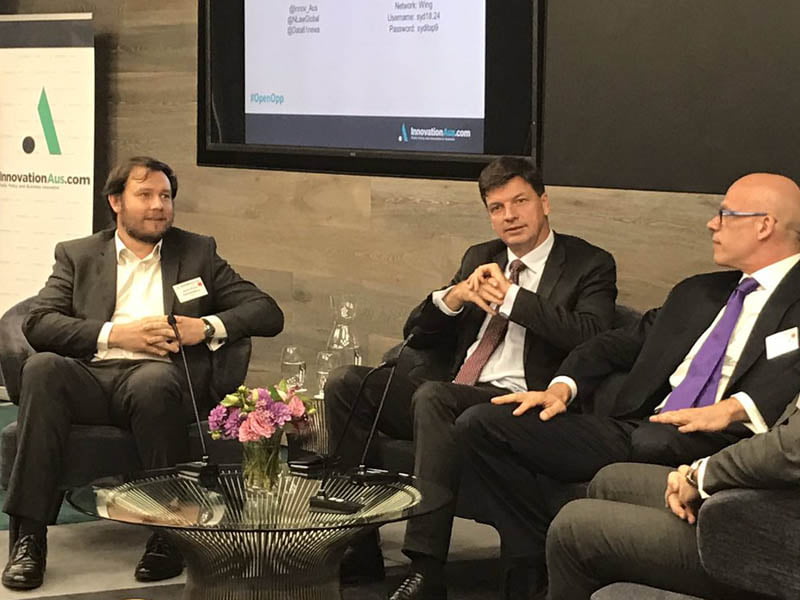Senior public servants with concerns about how Angus Taylor’s new tech procurement plans will impact their run-of-business ICT operations should know more in the two weeks with the release of a discussion paper to outline the early thinking.
With the rules that govern $6 billion worth of annual Commonwealth spending on ICT at stake, it’s fair to say the vendor community will have a passing interest in the paper, which will be published in the week starting November 28.
Mr Taylor, the Assistant Minister for Digital Transformation and Cities, said the release of the paper would be followed by an industry roundtable in procurement in early December, with others held in Melbourne, Canberra and Perth either late this year or early next.

As dry as the reform of arcane Commonwealth procurement rules might be, Mr Taylor maintains it is a central policy lever for driving innovation within the public sector.
The aim, he says, is to make government more ‘porous’ to ideas and new ways of doing things. By changing regulatory restrictions, the reform should make it easier for outside innovation and expertise to make its way into government.
It’s the same thinking that has driven chief digital officer Paul Shetler’s drive to build a digital marketplace as a priority issue inside the Digital Transformation Office (now re-badged and re-structured as the Digital Transformation Agency.)
The discussion paper represents the first step in delivering the Coalition election commitment to overhaul tech procurement. The paper has been put together by a cross-agency ICT Procurement Taskforce managed within the Department of Prime Minister and Cabinet and put together immediately after the July election.
“This is the summation of the task force’s early investigation and a view of the process, barriers and opportunities in ICT procurement,” Mr Taylor said.
The paper would be “the beginning of one of the most important conversations that we will have in ICT over the next year.”
The taskforce had found the Commonweatlh currently maintain 70 different ICT procurements, meaning businesses that do business with government are loaded up with the cost of maintaining their position on each.
“It’s simply onerous and inefficient in the way it does things. Those hidden regulatory costs, which can add up to hundreds of millions of dollars across the industry, really have to stop.”
This is where the ex-McKinsey politician brings his management consulting experience to bear. Expect to hear the word ‘benchmarking’ over and over in the next year.
In large organisations, most innovation comes from the outside rather than from within, Mr Taylor told the Open Opportunity Forum in Sydney on Thursday morning.
“Those from within need to enable it and facilitate it but much of the new thinking will come from outside. If we are to make it easier … for outsiders to deal with government, we need to make Government porous – we need to let the outsiders in,” Mr Taylor said
“That means moving away from traditional ‘we always know best’ procurement policies. It means benchmarking ourselves versus the way the private sector does at its best.”
“If you look at Google, Facebook, Uber, or Domino’s Pizza – all deliver high-quality services to the same people that government services are being provided to.”
“We’re being benchmarked [by citizens] against the very best.”
The procurement changes will likely range from the mundane to the controversial. The restructure of procurement will say less about how government buys technology products and more about how it delivers traditional services of government.
A central discussion rests with the release of data. Mr Taylor says there are a range of services that have been traditionally delivered by government that could more effectively be delivered by the private sector.
How these new services are built will depend on the release of data, he said. The government has held it first High-Value Data roundtable with the academic and research community and has promised a series of others to engage the tech industry, business stakeholders and not-for-profit.
“The single biggest change that the new DTA will make will be in the procurement landscape. In the short term, it is to view the investment, procurement and strategy as one single process,” Mr Taylor said.
“That needs to be seen as a continuum. If we don’t apply that holistic strategy to how we buy technology, we can’t hope to deliver the sort of innovations that citizens want.
“Only then can we take advantage of developments like the cloud or robotics which we know are going to have a very big impact on services across the economy, but that includes of course government services.”
To do all of this, I think we need to continually ask ourselves three fundamental questions.
• when does Government need to own the solution?,
• when can Government partner for the solution? and
• when can the Government provide secure and reliable APIs and let the private sector innovate to provide the solution
Do you know more? Contact James Riley via Email.

